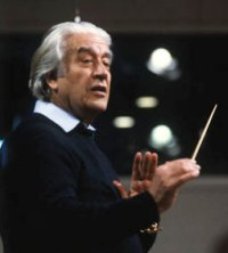
Rehearsing an Orchestra: Sergiu Celibidache. Part VI. A Conducting Primer by Leonid Grin
Part VI. Sergiu Celibidache, the pedagogue.

The third category
of conductors described by Leonid Grin at his lecture/master at Neeme Järvi’s
Summer Academy in Estonia is “the pedagogues.”
“Some of the
best names belong to this category,” he said.
As an exemplar, he chose Romanian conductor Sergiu Celibidache (1912-1996).
(Kyril Kondrashin, one of Grin’s
professors at the Moscow Conservatory, was another great pedagogue, he noted.)
“The marvelous
charge of these conductors is being pedagogues of the orchestra. They not only correct the orchestra, but by
correcting, they teach the orchestra. During rehearsal, they create a special kind
of technique, even exercise, by explaining meticulously, passionately, the
issues they are working on. Seven times,
ten times, a thousand times, they correct, teach and repeat.”
Celibidache might ask the first bassoon to
play with the fourth stand of first violins, for example, said Grin: “’You play legato and you play staccato. Now you play staccato and you play legato.’ Regardless of the speed, it should always be
together. The same thing with the oboe
and the viola section. Now with timpani.’ By doing that, he taught the orchestra. He gave them exercises and brought an
awareness of making music together.”
Musicians in
different sections of the orchestra may not be aware of how they sound vis a
vis other sections, how loud they are or how together they are, Grin said. “They don’t make music together. They play notes together.”
When Grin works with an orchestra, he does
this same kind of segmentation, he said. “Say, two stands of first violins and
the last stand of celli. Now the first
stands. Sometimes I say, ‘OK, you play
alone.’ I just listen. I don’t conduct. Playing alone, musicians pay attention to the
quality of their sound.”
To
illustrate, Grin noted the differences in articulation of the wind section during
a rehearsal of the Pärnu City Orchestra that had just taken place as part of the Summer
Academy conducting sessions. “The
bassoons and the clarinets played different lengths. There were three different colors in the
horns and they cut off at different times.
They didn’t have ensemble. My
message is let’s make a chamber orchestra. Any performance is chamber music
philosophy. All things should
coordinate.”
It takes
time and discipline to accomplish this, said Grin, noting another “phenomenal pedagogue,”
George Szell, and also Loren Maazel (Szell’s successor at the Cleveland
Orchestra).
To sum up
his lecture on rehearsal techniques, Grin proffered this model:
“The best
would be if we could combine the three rehearsal techniques of artistry
(Bernstein), pedagogic intuition (Celibidache) and consciousness of mind in achieving
perfection (Karajan). If there can ever
be a living conductor able to combine these qualities into one, that one will
be the conductor of the Heaven Orchestra.”
In conclusion,
Grin told his students this “beautiful joke” from the musicians of the Berlin
Philharmonic Orchestra:
“God sends
his angels to Earth to select a music director for the orchestra in
Heaven. He gives two names to his
messengers, Bernstein and Karajan. The
angels come first to Bernstein and tell him that God has sent them to him as a candidate
for music director of the Heaven Orchestra.
‘Don’t waste your time,’ says Bernstein.
‘I have the best cognac. Have a
good time and then go to your Father.’
The angels say afterward, ‘Thanks so much for your hospitality. We have God’s task. We have to visit Karajan, too.’
“They come
to Karajan and tell him, ‘Our heavenly Father has asked us to figure out who
will be his music director. We visited
Bernstein and now you.’ Karajan stays silent
for a minute, two minutes, three minutes, then says, ‘You know, angels, I don’t
remember giving you such a task.’”